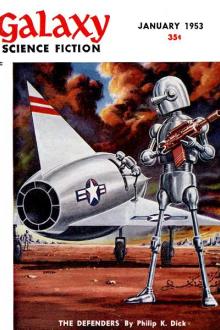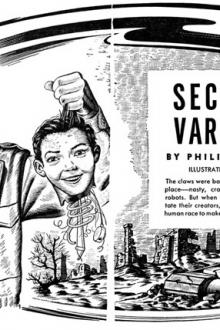Short Fiction, Philip K. Dick [best large ereader .txt] 📗

- Author: Philip K. Dick
Book online «Short Fiction, Philip K. Dick [best large ereader .txt] 📗». Author Philip K. Dick
“Look what happens when one person steps away from his job. Everything else begins to creak. We can’t service the bugs if no one services the machines. We can’t order food to feed the crews if no one makes out reports, takes inventories. We can’t direct any kind of activity if the Second in Command decides to go out and sit in the sun all day.
“Thirty people, one tenth of the Garrison. But we can’t run without them. The Garrison is built that way. If you take the supports out the whole building falls. No one can leave. We’re all tied here, and these people know it. They know they have no right to do that, run off on their own. No one has that right anymore. We’re all too tightly interwoven to suddenly start doing what we want. It’s unfair to the rest, the majority.”
Harris nodded. “Chief, can I ask you something?”
“What is it?”
“Are there any inhabitants on the asteroid? Any natives?”
“Natives?” Watts considered. “Yes, there’s some kind of aborigines living out there.” He waved vaguely toward the window.
“What are they like? Have you seen them?”
“Yes, I’ve seen them. At least, I saw them when we first came here. They hung around for a while, watching us, then after a time they disappeared.”
“Did they die off? Diseases of some kind?”
“No. They just—just disappeared. Into their forest. They’re still there, someplace.”
“What kind of people are they?”
“Well, the story is that they’re originally from Mars. They don’t look much like Martians, though. They’re dark, a kind of coppery color. Thin. Very agile, in their own way. They hunt and fish. No written language. We don’t pay much attention to them.”
“I see.” Harris paused. “Chief, have you ever heard of anything called—the Pipers?”
“The Pipers?” Watts frowned. “No. Why?”
“The patients mentioned something called the Pipers. According to Bradshaw, the Pipers taught him to become a plant. He learned it from them, a kind of teaching.”
“The Pipers. What are they?”
“I don’t know,” Harris admitted. “I thought maybe you might know. My first assumption, of course, was that they’re the natives. But now I’m not so sure, not after hearing your description of them.”
“The natives are primitive savages. They don’t have anything to teach anybody, especially a top-flight biologist.”
Harris hesitated. “Chief, I’d like to go into the woods and look around. Is that possible?”
“Certainly. I can arrange it for you. I’ll give you one of the men to show you around.”
“I’d rather go alone. Is there any danger?”
“No, none that I know of. Except—”
“Except the Pipers,” Harris finished. “I know. Well, there’s only one way to find them, and that’s it. I’ll have to take my chances.”
“If you walk in a straight line,” Chief Watts said, “you’ll find yourself back at the Garrison in about six hours. It’s a damn small asteroid. There’s a couple of streams and lakes, so don’t fall in.”
“How about snakes or poisonous insects?”
“Nothing like that reported. We did a lot of tramping around at first, but it’s grown back now, the way it was. We never encountered anything dangerous.”
“Thanks, Chief,” Harris said. They shook hands. “I’ll see you before nightfall.”
“Good luck.” The Chief and his two armed escorts turned and went back across the rise, down the other side toward the Garrison. Harris watched them go until they disappeared inside the building. Then he turned and started into the grove of trees.
The woods were very silent around him as he walked. Trees towered up on all sides of him, huge dark-green trees like eucalyptus. The ground underfoot was soft with endless leaves that had fallen and rotted into soil. After a while the grove of high trees fell behind and he found himself crossing a dry meadow, the grass and weeds burned brown in the sun. Insects buzzed around him, rising up from the dry weed-stalks. Something scuttled ahead, hurrying through the undergrowth. He caught sight of a grey ball with many legs, scampering furiously, its antennae weaving.
The meadow ended at the bottom of a hill. He was going up, now, going higher and higher. Ahead of him an endless expanse of green rose, acres of wild growth. He scrambled to the top finally, blowing and panting, catching his breath.
He went on. Now he was going down again, plunging into a deep gully. Tall ferns grew, as large as trees. He was entering a living Jurassic forest, ferns that stretched out endlessly ahead of him. Down he went, walking carefully. The air began to turn cold around him. The floor of the gully was damp and silent; underfoot the ground was almost wet.
He came out on a level table. It was dark, with the ferns growing up on all sides, dense growths of ferns, silent and unmoving. He came upon a natural path, an old stream bed, rough and rocky, but easy to follow. The air was thick and oppressive. Beyond the ferns he could see the side of the next hill, a green field rising up.
Something grey was ahead. Rocks, piled-up boulders, scattered and stacked here and there. The stream bed led directly to them. Apparently this had been a pool of some kind, a stream emptying from it. He climbed the first of the boulders awkwardly, feeling his way up. At the top he paused, resting again.
As yet he had had no luck. So far he had not met any of the natives. It would be through them that he would find the mysterious Pipers that were stealing the men away, if such really existed. If he could find the natives, talk to them, perhaps he could find out something. But as yet he had been unsuccessful. He looked around. The woods were very silent. A slight breeze moved through the ferns, rustling them, but that was all. Where were the natives? Probably they had a settlement of some sort, huts, a clearing. The asteroid was small; he should be able to find them by nightfall.
He started down the rocks.





Comments (0)